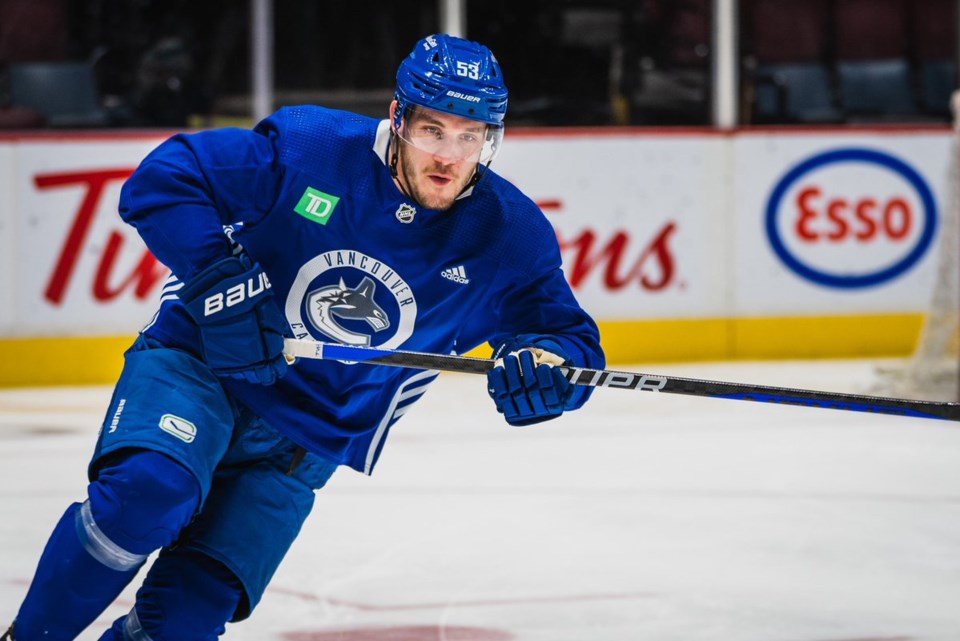In multiple interviews this season, Vancouver Canucks general manager Patrik Allvin has taken the opportunity to point out that his team was the sixth-youngest team in the NHL at the start of the season.
It’s been part of Allvin’s argument that the Canucks are still a young team, perhaps deflecting away some of the concerns with the team’s struggles this season.
“I think we have a lot of young and good players here,” said Allvin in October after the Canucks’ seven-game losing streak to start the season. “I believe we were the sixth-youngest team in the league on the opening night roster, so I definitely think this young group still has a lot of things to learn and part of it being facing adversity and how they come out of it, but I definitely have faith in this young core.”
Allvin reiterated this claim in December when he appeared on Hockey Night in Canada’s After Hours program, this time bringing it up in regards to his vision of the team and plan for the future.
“When Jim and I came in here, there were a lot of good young pieces here on the team and we want to continue to add younger players, preferably 25 and younger, and I think we’ve been able to do so at this point and it takes time,” said Allvin. “We were the sixth-youngest team starting in the league, so we’ve got a lot of young, good players here. We just need to add and to continue to build here and emphasize the right things.”
The message is essentially the same: the Canucks are a young team going through growing pains but by continuing to add more young players, he will build a winning team, “brick by brick,” as Allvin is fond of saying.”
But are the Canucks really that young?
At one point, that was true. The Canucks' young core of Quinn Hughes, Elias Pettersson, Thatcher Demko, Brock Boeser, and Bo Horvat looked immensely promising, even as management failed to build a quality team around them. But are they still young?
Let’s start with Allvin’s central claim that the Canucks were the sixth-youngest team at the start of the season. It turns out, he was selling the Canucks short — from the opening rosters submitted at the start of the season, the Canucks were actually the second-youngest team in the league.
The average age of the Canucks’ opening-night roster was 25.6, just behind the youngest team, the Buffalo Sabres, whose average age was 25.4.
Here’s the thing: that number was artificially low thanks to the inclusion of 19-year-old Danila Klimovich on the roster purely so the team could be perfectly up against the salary cap to start the season.
Klimovich never played a game for the Canucks and was immediately sent back down to Abbotsford in the AHL. As the season has progressed, he’s been joined by several other young Canucks: 21-year-old Vasily Podkolzin, 22-year-old Nils Höglander and Nils Åman, and 23-year-old Jack Rathbone.
As a result, the Canucks are not as young as they were when they submitted their opening night roster.
With their current roster, the Canucks’ average age is up to 26.6, which is 18th in the NHL. In other words, the Canucks are actually slightly older than the average NHL team this season
This is understandable when you look at the players who have actually taken the ice for the Canucks this season. The youngest to actually appear in a game is the 21-year-old Podkolzin and then the 22-year-old Höglander, who are now both in the AHL. After that, it's two 23-year-olds, Jack Studnicka and Hughes.
Other NHL teams have teenagers and 20-year-olds pushing for ice time; the Canucks don’t. Meanwhile, the Canucks have one of the worst prospect pipelines in the NHL , so there’s not a lot of younger help on the way.
It’s actually quite interesting how the Canucks have seemingly systematically removed their youngest players from the roster and stashed them in Abbotsford. Is this a case of those young players not being as good as hoped or a desire to keep these young players out of a toxic, losing environment in Vancouver?
When you look at the Canucks’ key players — their top-six forwards and top-four defencemen, youth isn’t the first thing that comes to mind. Sure, Hughes and Pettersson are still young at 23 and 24. Boeser and Ethan Bear are 25, though Boeser is just over a month away from 26.
Horvat and Demko are 27, Ilya Mikheyev is 28, and J.T. Miller is 29 — those are older, veteran players. Oliver Ekman-Larsson is 31, Tyler Myers is 32, and Luke Schenn is 33 — by NHL standards, they’re old fogeys.
What is a young team? Does having two core players under 25 in Hughes and Pettersson make the Canucks a young team?
The answer to that question is key to how the Canucks progress from here. If the Canucks are still a young team on the rise like Allvin has suggested, then a slow-and-steady approach is warranted.
But if the Canucks are no longer a young team, then more drastic steps need to be taken.
With several young players demoted to the AHL, an aging core, and a shallow prospect pool, it seems clear that the Canucks are no longer a young team on the rise.




